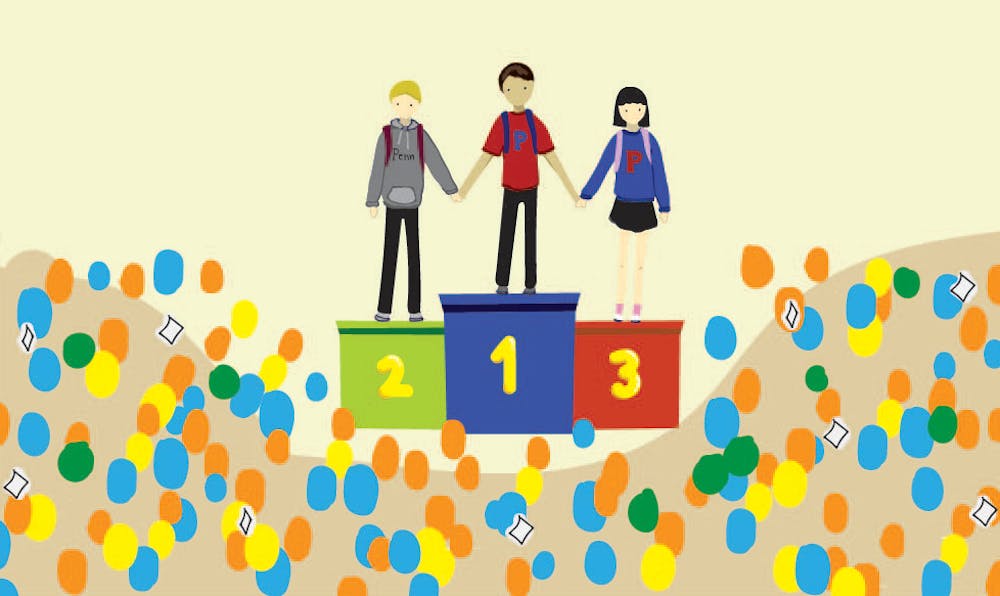
The two phrases most commonly used to describe Penn are "pre-professional" and "competitive." Even among the notoriously competitive Ivy League, our university stands out for its cutthroat culture.
Arriving on campus last year, the atmosphere certainly lived up to the reputation. If you had told me Penn’s competitive culture would be one of my favorite aspects of my college experience when I was pressured into taking an additional class a few semesters ago, I would have thought you were crazy.
How on Earth could a culture that contributes to mental health issues on campus and hinders students from fully exploring college even remotely be a positive?
However, watching my peers grow over the past year has convinced me that Penn students are not only responsible for this culture, but also stand to benefit the most from it. It’s no secret that Penn's culture stems from a long-standing tradition of students comparing themselves to one another and feeling the need to outdo each other, and the constant preoccupation with future career opportunities certainly amplifies that feeling. It's this history of stress that has put a negative stigma on competition.
However, competition — used correctly — is inherently beneficial. Competition can be channeled into motivation to raise the abilities of an entire group. It's at Penn where most of us consider our day-to-day lives to be an overkill of competition, that this drive to succeed becomes associated with an unhealthy amount of stress. Too often we bring each other down rather than rise up together.
Here's where I disagree. I believe that Penn's culture can bring out the best in us, although it may not seem like it at first.
We are all here for a reason — we performed well in high school. We competed, we learned, we overcame. The competitive culture at Penn challenges us to continue doing that, albeit among a more accomplished pool and with more responsibilities and goals to manage. It challenges us to overcome the need for the validation that comes from being better than our peers. It challenges us to disregard the feeling of inadequacy and jealousy that strikes us when one of our peers finds success. We have the opportunity to prove to no one but ourselves that we can build a bulletproof personality, unfazed by our surroundings and rooted in self-confidence.

What lies on the other side of this challenge is priceless. When students finally overcome that need for constant comparison and use competition solely as a motivation rather than a hindrance, they will find themselves filled with more self-confidence, composure, and poise than ever before. And what better preparation is there for the real world, where competition and stress are ever-present at a universal scale?
I've already seen this happen with some of my closest friends. What started off as a nagging feeling of insufficiency a few months into freshman year has gradually turned into resounding self-confidence and unequivocal decision-making. In the face of never-ending competition, my friends have realized their feelings are in their control. And that transition has made them cognizant of their values, priorities, and true goals.
By no means am I discounting the importance of mental health. I’m proud of the University’s expansion of mental health resources, and acknowledge the need for even more resources to address these issues in an honest manner. I find the mental health problems on campus to be a troubling and unfavorable product of Penn's culture. However, if the pervasion of Penn's intense culture has taught us anything, it's that we can change the perception of competition collectively. Once we start to embrace this culture as a gift — a chance at improvement, rather than a curse — we will find students building tremendous mental and emotional strength.
So, Penn's campus culture is not something that ruins it. Rather, it can become one of the favorable things about Penn. But that can only happen once we all buy into it.
So, I urge you: The next time you feel frustrated, upset, inadequate, stressed while comparing yourself to your peers and expectations, challenge yourself. Challenge yourself to let that motivate you but not affect you. Challenge yourself to be confident in who you are and what you do. What you'll find in that challenge will be much more worthwhile than any satisfaction you could gain from outdoing a peer — or taking an additional class.

MOKSH JAWA is a Wharton and Engineering sophomore from Fremont, Calif. His email address is moksh@wharton.upenn.edu.
The Daily Pennsylvanian is an independent, student-run newspaper. Please consider making a donation to support the coverage that shapes the University. Your generosity ensures a future of strong journalism at Penn.
Donate







